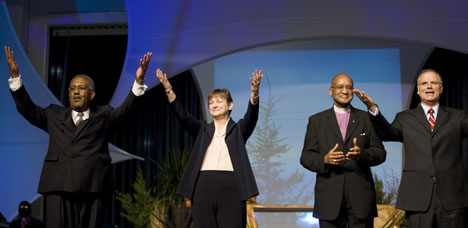Do United Methodists really want to welcome the poor and downtrodden into their midst? Or do they prefer those sitting in the pews to "look just like us?"
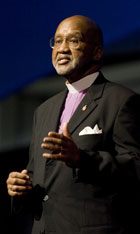
Bishop Felton May
That question was posed by Bishop Felton May to delegates at General Conference during an April 24 presentation on four areas of focus that will guide the future work of the denomination's general agencies.
"Somehow, in our 40 years, poverty became acceptable to us," he told the legislative gathering. "We permitted ourselves to join the rest of the world in complacency. But here, at our 40-year anniversary, for the love of God, The United Methodist Church declares, no more!"
That declaration drew applause from the delegates as May, who currently serves as the interim top executive for the United Methodist Board of Global Ministries, joined with the staff leaders of three other church agencies to explain the focus areas.
The four areas of focus are: 1) Engaging in ministry with the poor; 2) creating new places for new people and renewing existing congregations; 3) stamping out diseases of poverty by improving health globally; and 4) developing principled Christian leaders for the church and the world.
John Wesley, the founder of Methodism, considered health and wholeness to be a matter of spiritual concern, and the Rev. Larry Hollon, chief executive, United Methodist Communications, pointed out that "reversing the pain and physical suffering experienced by the world's poor is a powerful, tangible method of serving as God's witness."
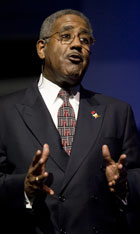
The Rev. Jerome Del Pino
The Rev. Jerome King Del Pino, chief executive, United Methodist Board of Higher Education and Ministry, admitted that stamping out disease is an "ambitious" notion. But, he said, church leaders "believe that by interconnecting the resources, capacities and skills of the entire United Methodist community, we can help to significantly reduce deaths caused by the diseases of poverty."
Such work can be accomplished by creating and renewing congregations, according to the Rev. Karen Greenwaldt, chief executive, United Methodist Board of Discipleship.
"Jesus calls us to bring more people to follow Christ to the cross &ellipsis; to give their very lives for the gospel," she said. "We do so because we have encountered God's love-and our response compels us to move out to share the story of Jesus' love with all kinds of people. These new Christians find healing for their broken lives and move to heal the brokenness of the world."
Principled Christian leaders also are needed. "We live in a world that once had courageous Christian leaders, but now cries out for them-the kinds of women and men who are set apart to show by example how to live faithfully in bold discipleship and to engage a world starving for the gospel," Del Pino said.
"This focus area is not about recruiting pastors to occupy pulpits on Sundays-while that would be a critical and needed result," Hollon explained. "Instead, it is about cultivating a whole new paradigm of leadership that can engage a culture that has evolved in its color, complexity and global interconnectivity &ellipsis; and is no longer hospitable to the message of Christ."
To achieve the denomination's goals, the agencies will integrate their budgets around the four focus areas.
Among the goals on poverty:
-
Increase by 25 percent service to the poor in the United States through the 102 existing mission institutions.
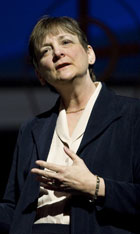
The Rev. Karen Greenwaldt
- Train and place 50 indigenous leaders with strategic mission partners in poor locales to respond to critical issues of importance to women and children.
- Develop five pilot projects to respond to poverty in Africa, Asia, Latin America and the United States.
- Train one advocate for the poor in every annual conference.
Goals for global health:
- Work with international partners to reduce by 66 percent malaria-related deaths of children under the age of 5.
- Develop opportunities for 60 percent of annual conferences to become involved with advocacy for health issues such as access to health care, disease, and infant mortality.
- Deploy 53 new missionaries for global health, along with medical missionaries, to Africa, Asia and Latin America.
- Expand by 20 percent programs designed to address substance abuse and related violence.
Goals for new and renewed congregations:
- Find people on the edge of society not now being addressed in United Methodist congregations.
- Start 400 churches outside the United States by the end of the year 2012.
- Recruit 1,000 new church planters to start 650 new churches in the United States, in partnership with annual conferences, targeting 50 percent of those to be racial and ethnic congregations.
- Develop 10 new intentional multi-cultural churches and revitalize 22 town and country and urban churches.
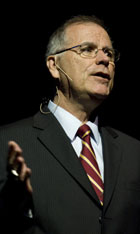
The Rev. Larry Hollon
Goals for Christian leadership:
- Provide short-term mission experiences for 100 young people to explore and reflect on professional Christian service.
- Train 9,500 people in theology, church administration, evangelism, discipleship formation and mission outreach in Africa and Asia.
- Build a network of 100 prophetic pastors and lay members around the world and provide them with opportunities to work for social justice.
- Increase by 25 percent the number of candidates for ordained ministry who are under age 35.
- Increase by 20 percent the number of women senior pastors serving large-membership churches in The United Methodist Church.
"Now thousands-and soon we hope millions-of our brothers and sisters across the church are joining us in eschewing the status quo and embracing the discomfort of this bold new endeavor," May said. "For the four Areas of Focus greet us as a challenge and an invitation to set aside our differences and get on with mission and ministry as co-laborers with Jesus Christ."
*Bloom is a UMNS writer based in New York.
News media contact: Linda Bloom, e-mail: newsdesk@umcom.org.
Related Article
Resource
Like what you're reading? Support the ministry of UM News! Your support ensures the latest denominational news, dynamic stories and informative articles will continue to connect our global community. Make a tax-deductible donation at ResourceUMC.org/GiveUMCom.

